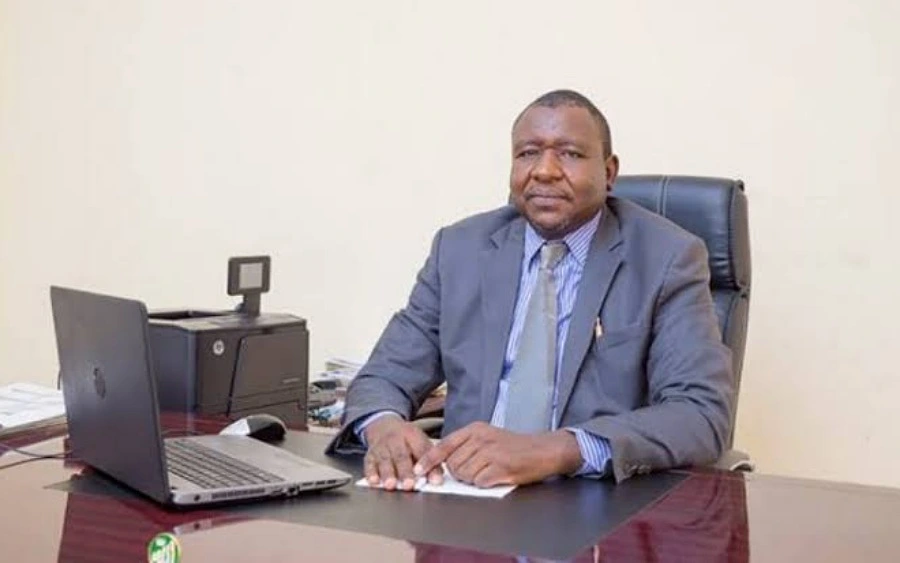Task before new RMFAC boss
President Muhammadu Buhari recently swore in Shehu Mohamed Bello as Chairman of the Revenue Mobilisation and Fiscal Commission (RMFAC), following the latter’s confirmation by the Senate and in line with the provisions of the constitution. The appointment of Bello also came after the voluntary resignation of Elias Nwalem Mbam, the immediate past chairman of the […]

President Muhammadu Buhari recently swore in Shehu Mohamed Bello as Chairman of the Revenue Mobilisation and Fiscal Commission (RMFAC), following the latter’s confirmation by the Senate and in line with the provisions of the constitution. The appointment of Bello also came after the voluntary resignation of Elias Nwalem Mbam, the immediate past chairman of the commission.
By his appointment, Bello is expected to direct the commission towards executing the functions of the RMFAC as spelt out in Paragraph 32(a-e) of Part One to the Third Schedule of the constitution. These include the monitoring of the accruals to and disbursement of revenue from the Federation Account, as well as review at the due time, the revenue allocation formulae for the country. Other functions include advising the federal and state governments on fiscal issues as well as determining the remunerations of all political office holders mentioned in Sections 84 and 124 of the constitution. These functions define the RMFAC as a key stakeholder in the economic fortunes of the country.
Against the backdrop of the prevailing state of affairs in governance across Nigeria, it is obvious that Bello has come into an office of strategic significance to the country and at a most challenging period in its history. He is coming at a time of significant fiscal challenges such as massive drop in government revenues and widespread leakages of same through numerous loopholes – including outright looting of public funds by unscrupulous officials. Considering that by its statutory mandate, these developments constitute a tact indictment on the RMFAC whose role is much more than that of a gate keeper of the country’s common patrimony, Bello needs to see his appointment as a call to redeem the agency and the country, through initiating a new template for changing its course as a strategic national institution.
Without equivocation, the challenges which Bello as the new helmsman of the RMFAC will be confronted with are a legion of incontinence that haunt the country’s fiscal regime, and which deepen their stranglehold on the economy by the passing day, courtesy of a less than assertive grip on them by the RMFAC. Against the expansive constitutional mandate of the RMFAC, it is envisaged that the agency should establish a dispensation of functional, operational convergence with all revenue-generating agencies, MDAs that are incurring expenditure on government account, as well as the anti-graft agencies of government. Granted that the agency may claim to have such in place, the trending instances of massive hemorrhaging of government largesse through looting and wastage of such, should not have been so widespread. Hence, the agency needs to rise up to its constitutional responsibility.
In more specific terms, the performance of the RMFAC overtime, with respect to its constitutional mandate and public expectations, leaves much to be desired. An eclectic appraisal of such key functions clearly calls for more gusto in service delivery by it, according to law. For instance, with respect to monitoring the inflow and outflow of the country’s revenue, the RMFAC is yet to score a convincing point in the public domain that it is on top of its act. Among the more disturbing stories is that of inconsistency in its operations. Coming to its responsibility of recommending changes in the country’s revenue-sharing formula for the three arms of governance, the incontinence of the RMFAC could not be more glaring as the formula has not been reviewed for the past 29 years, in spite of incessant clamour by supposedly aggrieved sections of this multiethnic country.
In the same vein, the advisory role of the RMFAC towards promoting fiscal discipline among the various tiers of governance also needs a review as so far such has not been seen to be yielding the desired impact. It needs not be emphasised that financial indiscipline is the rave among government officials across the country. Also in the same direction has the issue of determining the remunerations of political office holders remained problematic with the personal emoluments by federal and state legislators serving as sore points in this regard.
Essentially, it needs to be considered that it was with the intention that the RMFAC should deliver on these afore-mentioned functions that it was conferred with membership of agencies as the Federation Accounts Allocation Committee (FAAC), the State Joint Local Government Account Allocation (SJLGAAC), the Joint Tax Board (JTB), Niger Delta Development Commission (NDDC), Commission on Ecological Fund among others. In addition, its enabling act also empowers the RMFAC to demand and obtain information from all revenue-generating agencies of government.
With the foregoing as guide, the task for Bello as the new helmsman of the RMFAC is clear. Nigerians hope that a paradigm shift towards a new fiscal regime will be installed at the agency to fast track the reinvention of matters of the purse, for the country.
